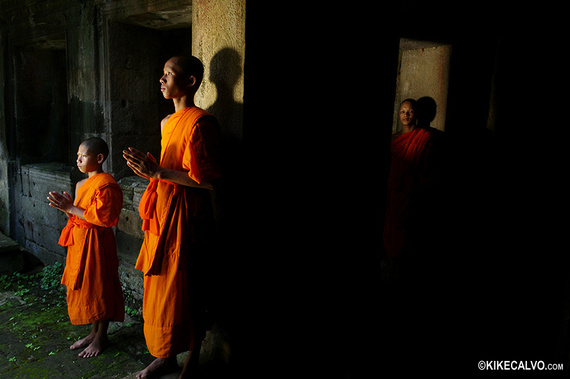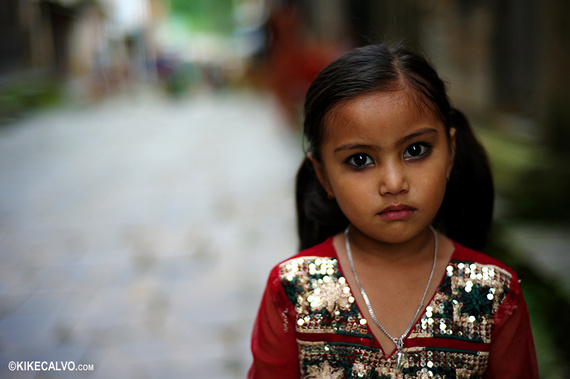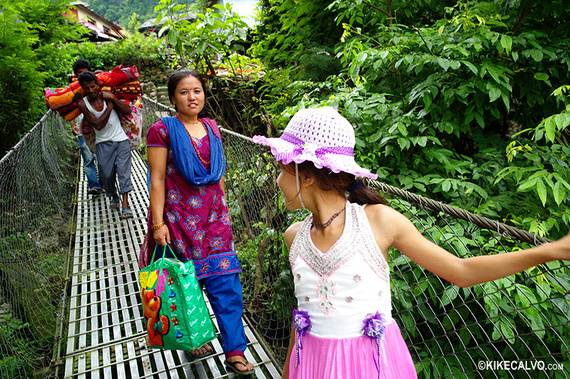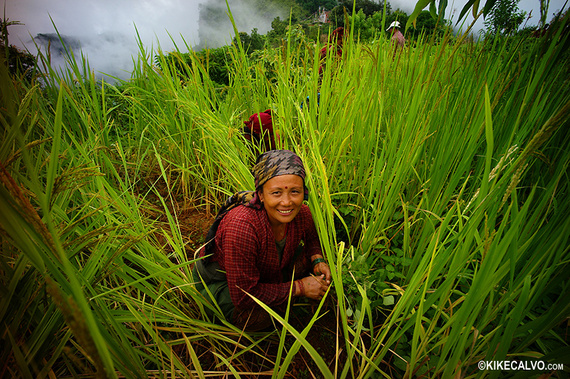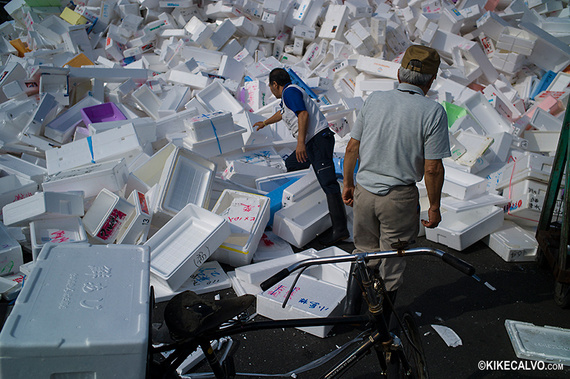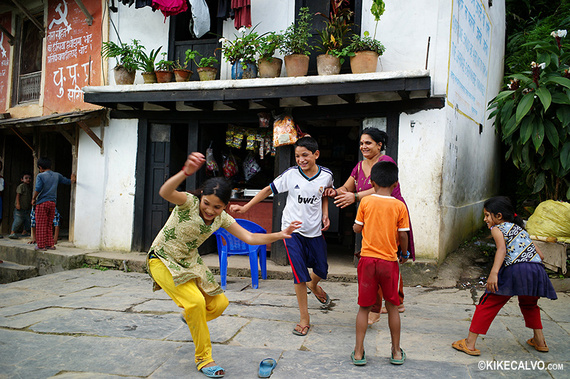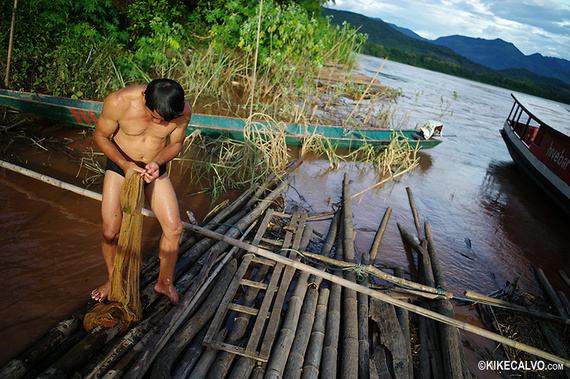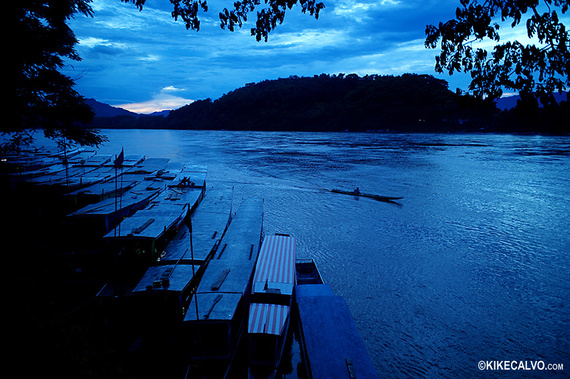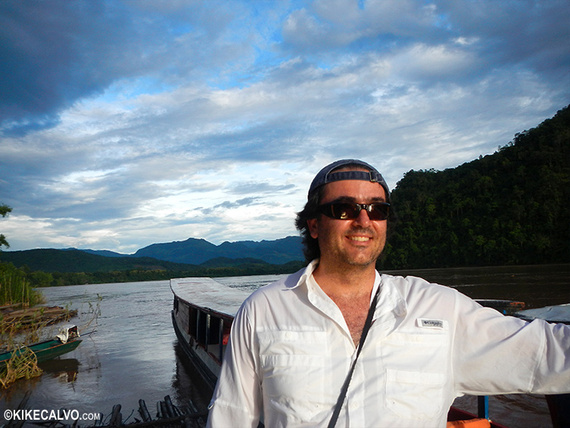By Kike Calvo, Photographer and National Geographic Expert
My mind races. It is 5 a.m. and I have not fallen asleep. I am awake after traveling from Bangkok to Tokyo, and from Tokyo to New York. It has been weeks that I have been touring Asia, with many lessons learned. Happy to report there have been no mishaps in any of the expeditions so far. Instead, I keep thinking of all those people who touched my life during this particular trip. Traveling motivates, traveling awakes, and traveling teaches. Because of this, I decided to make a small recount of all the lessons I have learned during the course of the trip.
1. The value of dignity and respect: There are photographic works and expeditions that change us. Perhaps I should say that all of them change us, but sometimes we do not realize it at the moment. Even though I am now thousands of miles away from Cambodia, I cannot stop thinking about Ms. Savarn. "The lady wept after posing for your photos, explained the director of Cambodia Landmine Survivors, Soun Tola." She was honored during the entire time that you focused on capturing the photographs, and taking the time to interview her. For her it was a memorable experience, a chance for Ms. Savam to feel just like everybody else, something that is not felt in her every daily life." She shared with me her sad misfortune that cost her an arm and a leg when she stepped on a landmine, which truly touched my heart. It reminded me once again that photographers, with a camera in hand, have a powerful tool for change with plenty of determination. A tool that should be used with caution, conviction, and passion, but without ever losing sight of the respect that should be shown to our subjects.
2. Those little things: From land to land, little by little, there are forged personalities, memories, and our careers. Many of us in journalism, when we first get started, we dream of making history, creating special photos that will last forever. Recently someone told me that my photography is becoming more personal, more intimate, with a closer connection to everyday life. It is those little things that make our projects work along our creative process. Ernesto Sabato could be paraphrased by saying that "a good photographer expresses great things with small moments, conversely to a not so good one, which expresses little with big pictures." Many small moments of great characters will appear soon on my next posts on National Geographic Newswatch column "Dreams of the World." I remember the words of Frederick Van Eden, who said that the sun accepts all, going through small windows. I think back of the dream from that girl in Bhaktapur on the outskirts of Kathmandu, who dreamed of one day becoming an actress, the dream of so many. How great the power of those little things that have the ability of amounting to so much.
3. The world reverberates to the beat of good people: The media is always bombarding us with news reports. As part of our training and education we learn from what we are told. We become very aware of everything that happens on the planet. However, when we cannot have the luxury of traveling, we begin to perceive the world as chaotic and full of negative energies. The truth is actually that the world has a lot of good people in it. In Cambodia, the performance of the circus acrobats captivated my mind. For years, Jean-Christophe Sidoit, who has worked on this project called Phare; Nita, that after living in exile in Paris for years as a result of the situation in Laos, decided to return home, in Luang Prabang, to fight for the preservation of the traditions and artistic expressions of their country. Now that I think, I can't remember the last time I sat down to watch the news in front of a TV. Even more, how long it has been since I have turned on my TV? By the way, where did I even store my TV? Quoting Ramon J. Sender, "My hands are too small in relation to all the life that has granted me." Let us not forget, that the world hosts countless stories that are really admirable.
4. We should never arrive to a destination with preconceived ideas: Ralph Waldo Emerson referred to this point by saying that even though we travel the world in search of beauty, we must also carry it with us, or we may not find it. I started my Asian journey tired, low on energy. My arrival in Nepal was not as expected. Places that I remembered fondly, had been transformed, becoming chaotic dirty spaces, full of tourists, in many cases. But the trip teaches you, just as life does. Although I laugh when I remember the phrase by Groucho Marx, "My son, happiness is made of small things: A small yacht, a small mansion, a small fortune," -- it saddens me that the world is thinking in this direction. The moment I freed myself from my burdens and preconceptions about Nepal, was a moment in which I was immersed in mud in a rice field in the Kathmandu valley, on the outskirts of Bandipur. I watched for several minutes a group of women working in the field. They looked at me and smiled, watching me completely covered with mud, as I tried to advance closer to capture them with my camera.
5. Long live globalization! Economies and governments are committed to growth. The world seeks access to international markets, and the desire for the arrival of thousands of tourists in the smallest places. Nepalí businessman Basnat explained to me his concern of how we were evolving towards a mono-culture in his country. In my case, I started to travel to avoid reading a single page of "the book." As St. Augustine said, "the world is like a book, and those who do not travel, read only a page." On my quest to find local crafts I remember starting to identify the same Chinese-made sculptures in various remote markets of Laos and Thailand. I began to worry. Are we more advanced in the process of mono-culture and globalization than I had originally envisioned?
6. The education of a child: Benjamin Franklin told us that human happiness is generally not achieved with great strokes of luck, which can occur rarely, but with little things that happen in our everyday actions. I am eternally grateful to my parents, who filled my room with books. They supported my childhood instincts to seek adventure, motivating me to collect fossils, minerals, stamps, and coins. In a recent National Geographic expedition, one of the travelers dearly thanked me, for having helped him remember the little things of life. Asia, with its traditions and contrasts, through my journey of thousands of miles, I remembered once again the idea of Joseph Heller: "I finally reached what I wanted to be more, a child."
7. Take health seriously: After getting home, I started with the usual post-travel routines, trying to open the bag as soon as possible, to avoid the "suitcase in the living room syndrome," which can last several days, as I have already experienced in the past. To my surprise, I discovered that my ankles were swollen. I could not see the usual curved lines. Worried, I decided to learn more about it. My ankles, were not "ankles" but "cankles." The term is used to refer to the accumulation of fluid in the feet and ankles, particularly noticeable in these areas, due to the effects of gravity, also known as peripheral edema. The real problem is not the swell, but the fact that clots can form in the veins of the legs (thromboembolism), could break off and travel to our lungs, heart, or brain. On long trips, try not to drink alcohol, and make a commitment to get up as often as possible, doing stretches and exercises. Some recommend taking an aspirin before the flight as well.
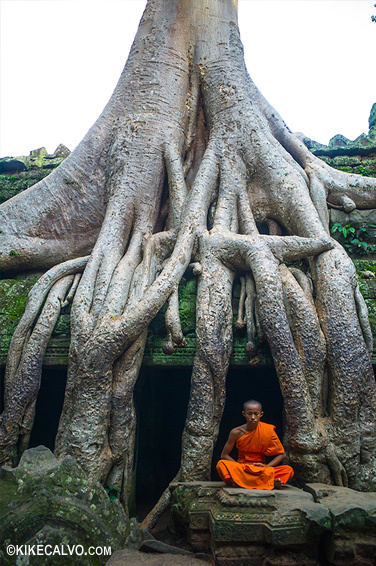
Buddhist monk mediates under a tree in Ta Phrom Temple. Angkor Wat Complex (Cambodia). Photograph © KIKE CALVO
8. Our financial contribution as travelers: I started to pay close attention to tourism in each country I visited. There are patterns, which have become global. In my visit to Angkor Wat, I watched many traveling in organized tours. In fact, some countries, organized packages, without hiring local guides, even preparing the same meals the travelers would find back home. For a moment, during an early morning near the temple of Ta Phrom, just before the arrival of the waves of tourists, the idea that much of the money is supposed to arrive to the destinations in the hands of those who travel, is by large kept by the larger tourism operations. Regardless of how much you invest in your trip, do not forget that the random purchases we execute, are the real contribution to the local economy: The bottle of water, the small sculptures or hiring those improvised guides that offer its services to explore the particular place.
9. Being away from things ... "does not make us forget them, but instead, love them even more," said Federico Ezequiel Gargiulo in his book Traces of Fire: Tales of an Expedition to the End of the Earth. Before the departure, we often worry about the stability, worry about what we are leaving behind, thinking that the passage of time and distance, could have a negative impact on them. However, truth be told that the experiences, the contrasts and smells, the sounds and sorrow, caressing the doors of our souls, end in us appreciating our own existence. Traveling teaches us. Buddha would talk of discovering our world, and then with all our heart, surrender to it.
10. The art of photography is changing. The ever evolving world is changing our work. While we must not forget that the photographs, like life itself, must be composed with feeling, heart, and instinct, and thinking only of rules, and proportions. By the way of the heart, that is the key to open so many doorways in life. The path is not outside. The path, our path, is to be found in our hearts. Our sky of possibilities, mission, and purpose are alive in the heart, and exists within us. Never stop dreaming.
